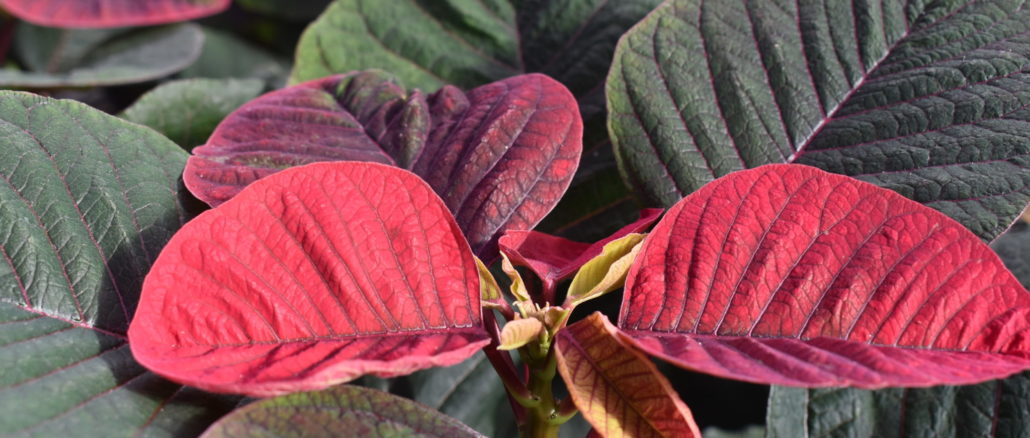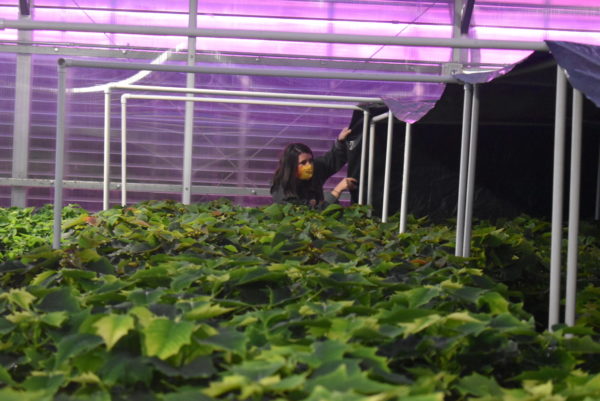
Support Northern Colorado Journalism
Show your support for North Forty News by helping us produce more content. It's a kind and simple gesture that will help us continue to bring more content to you.
BONUS - Donors get a link in their receipt to sign up for our once-per-week instant text messaging alert. Get your e-copy of North Forty News the moment it is released!
Click to Donate
Whether you pronounce them “poin-set-uh” or “poin-set-tee-ah” — either is correct BTW — the fact remains that getting these brilliantly colored holiday plants ready for Colorado State University’s poinsettia sale takes a lot of work.
But the annual event, run by the College of Agricultural Sciences’ Department of Horticulture and Landscape Architecture, is a holiday tradition that both its customers and the students who run it look forward to, said Joshua Craver. The assistant professor of controlled environmental horticulture runs the floriculture practicum, which teaches students how to grow the fickle plants each fall.
It’s one of several practicums offered with the overall goal of giving students hands-on experience in the greenhouse, Craver said.
“It’s really a great way for us to — in a sense — take the training wheels off and really push the students into a much more practical experience,” he said. “They’ve taken the majority of courses for the horticulture major up to this point, and now they get to put this knowledge into practice as they make decisions for a crop that they’re ultimately responsible for.”
Each student starts out with 50 plants from one poinsettia cultivar. They’re in charge of the day-in/day-out maintenance and decision-making for the crop.
“They’re actually very finicky plants,” said Emily Gritters, a senior horticulture major and a student in this fall’s floriculture practicum. “They can sometimes be very difficult to grow, and we’ve had a particularly difficult year.”
This season, that included battling an infestation of minute, but mighty bugs called thrips, a failed fertilizer injector and an unexpected cooling system malfunction that changed the carefully calculated temperature parameters previously set, Gritters said.
“We came into the greenhouse, and it was 95 degrees,” she said. “And that is very bad for poinsettias, so they had intense heat shock.”
This year’s poinsettias are thriving
The plants pulled through and are now thriving, but it’s those constant curve balls that mean they have to always be on their plant game, Gritters said. The students are in the greenhouse almost every day doing everything from watering the plants to pest management to testing fertilizer concentrations and checking the electrical conductivity and pH of their crop.
Then there is the daily tarping and untarping. Poinsettias are what’s known as a “short-day” crop meaning fall’s natural lessening of daylight triggers its bloom. Normally, greenhouses can rely on Mother Nature to handle that part. But when the horticulture department moved to its current greenhouse just south of campus, it was discovered that area streetlamps and even headlights from car traffic provided enough light to prevent the flowering response. That is why for the last nine weeks of the project students must cover the plants with a light-blocking tarp at about 5 p.m. each evening and then uncover them again around 8 a.m. the next morning.
Gritters said her cultivar, Orange Glow, was particularly challenging. When her branches began breaking, she went through a long checklist of possible contributing factors. Thankfully, the plants recovered.
Bright transformation color
“I was so frustrated, thinking my plants were dying,” she said. “And then I started seeing this really bright transformation color — going from gorgeous green to bright orange. And every day, you see it just a little bit more and more vibrant as we cool down the temperature. They look amazing.”
Craver agreed, saying that this year’s poinsettia crop is right on time for the sale. All funds from the event will be used to sustain the greenhouses and pay for the materials needed for next year’s poinsettia crops.
Last year, the event was held completely online due to the pandemic. It will return to an in-person sale this year to celebrate its 26th year.
“It’s always really gratifying for the students to have that interaction with customers and realize that all this work that they’re putting in is actually making a difference,” Craver said.
CSU Horticulture Center’s 26th annual Poinsettia Sale
The CSU Horticulture Center’s 26th annual Poinsettia Sale will be held from 2-6 pm Dec. 1-3 at the Horticulture Center located at 1707 Centre Ave. in Fort Collins and the cost is $10 per 6-inch pot. Cash, checks and credit cards will be accepted.
